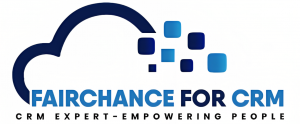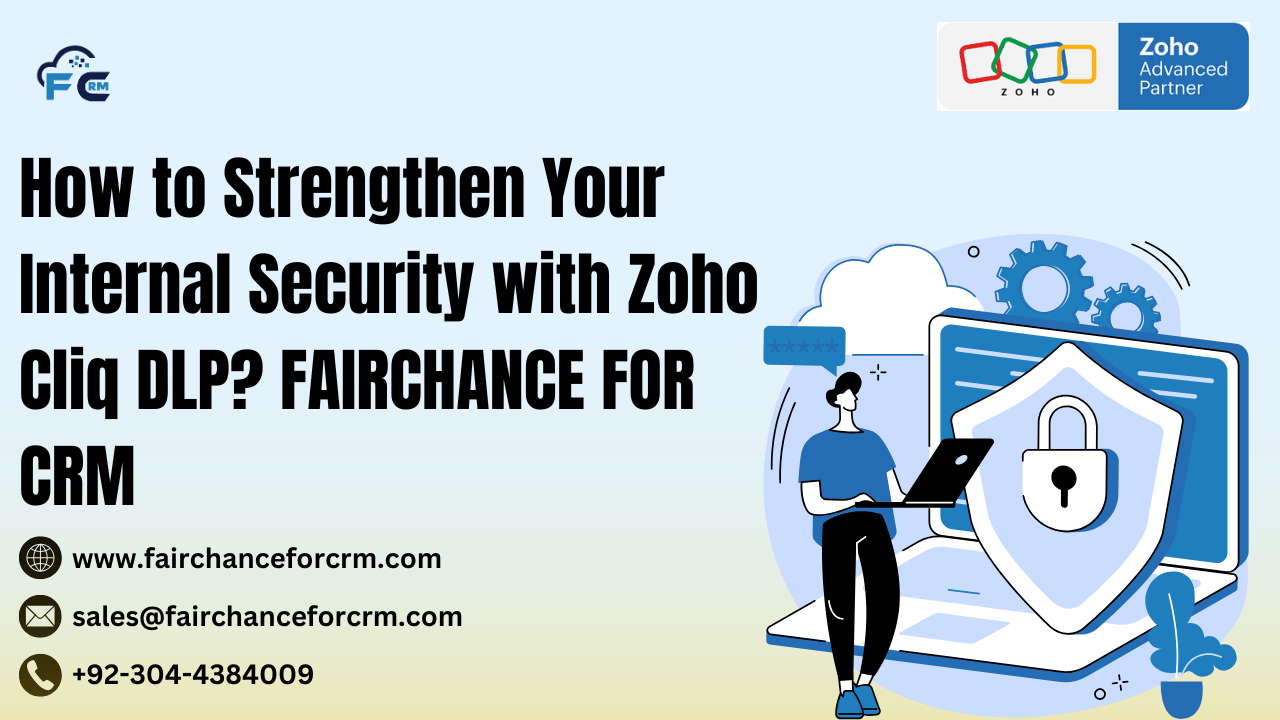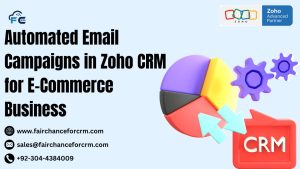How to Strengthen Your Internal Security with Zoho Cliq DLP? Data security is now a major concern for businesses of all sizes in the current digital world. Strong data loss prevention (DLP) procedures must be put in place to protect sensitive data due to the growing usage of collaborative tools like Zoho Cliq. A strong DLP solution is provided by team communication and collaboration platform Zoho Cliq, which assists businesses in protecting internal communications, avoiding data breaches, and adhering to legal obligations. With examples, advantages, and answers to commonly asked questions, this article examines how to improve internal security with Zoho Cliq DLP.
Also Read:
- Celebrating 10 Years of Zoho SalesIQ: Revolutionizing Customer Engagement Since 2014
- App Spotlight Unlocking All-in-One Accessibility with Zoho CRM
- Streamline Multi-Level Approval Workflows with Zoho Forms – FAIRCHANCE FOR CRM
- Top Zendesk Alternatives for 2025: FAIRCHANCE FOR CRM
- Zoho Cliq 6.0 Key Features for Productive Collaboration
How to Strengthen Your Internal Security with Zoho Cliq DLP?
A collection of tools called Zoho Cliq’s Data Loss Prevention (DLP) is intended to assist businesses in keeping an eye on, managing, and safeguarding private information that is shared on the platform. Within the organization’s communication channels, it enables managers to establish security policies that stop unauthorized sharing of private data via files, links, or messages. With Zoho Cliq’s DLP, you can block or restrict the sharing of critical data, ensuring it stays within secure boundaries.
Key Features of Internal Security with Zoho Cliq DLP
- Content-Based Restrictions: Administrators can set up content-based rules to filter sensitive information in messages and files. Credit card numbers, PINs, and other secret information, for instance, can be blocked from being shared. This lessens the chance of data breaches brought on by inadvertently disclosing private information.
- File Sharing Control: Zoho Cliq allows you to restrict or monitor file sharing within the platform. You can block the upload of certain file types or set up rules that allow only authorized users to share files. This function makes sure that private documents, such financial statements or intellectual property, stay inside the company.
- Link Restrictions: The DLP feature also lets you monitor and restrict sharing of external links. You can block links to unsecured or suspicious websites, preventing users from unknowingly sharing harmful or malicious content that could compromise internal security.
- Keyword-Based Detection: Zoho Cliq uses keyword-based detection to flag messages that contain predefined sensitive terms. For example, if your organization deals with sensitive financial data, you can set up a rule that triggers an alert whenever terms like “confidential”, “taxes”, or “bank account” appear in any conversation.
- Granular Control Over Permissions: Administrators have the flexibility to define DLP rules for specific channels, groups, or individual users. This ensures that the level of security is tailored to the sensitivity of the data being shared in different parts of the organization.
Examples of Strengthen Your Internal Security with Zoho Cliq DLP in Action
- Protecting Customer Data: A financial services company can use Zoho Cliq to monitor and restrict the sharing of sensitive customer data, such as account numbers or social security numbers. The DLP policies would automatically block any attempt to share this data in private messages, group chats, or files.
- Preventing Data Leaks in HR: In an HR department, sensitive documents like employee contracts, performance reviews, or personal identification details need to be secured. With Zoho Cliq DLP, administrators can enforce policies that prevent these files from being shared externally or across unsecured channels within the company.
- Securing Intellectual Property: A software development company can use Zoho Cliq DLP to protect intellectual property (IP) by restricting file sharing of source code, patents, or proprietary algorithms. The DLP policies can be set to block specific file extensions, such as
.exe,.zip, or.pdf, from being shared outside the organization’s trusted circles. - Compliance with Regulations: Zoho DLP can help organizations comply with regulations like GDPR, HIPAA, or PCI DSS by restricting the sharing of personal data or payment information. The system can flag any unauthorized sharing of this data and notify administrators for immediate action.
Benefits of Using Internal Security with Zoho Cliq DLP
- Enhanced Security: Zoho Cliq DLP ensures that sensitive data is not shared inappropriately, minimizing the risk of data breaches and leaks. This strengthens the organization’s overall security posture.
- Regulatory Compliance: Many industries require businesses to comply with data protection regulations. Organizations may use Zoho Cliq to implement security solutions that help them comply with regulations like PCI DSS, GDPR, and HIPAA.
- Reduced Human Error: Accidental data sharing is one of the most common causes of security breaches. DLP tools in Zoho Cliq help prevent this by automatically flagging or blocking sensitive data, reducing human error and increasing overall security.
- Streamlined Incident Management: In case of a potential security incident, Zoho DLP generates logs and alerts for administrators, enabling quick action to prevent or mitigate the impact of data leaks.
FAQs About How to Strengthen Your Internal Security with Zoho Cliq DLP
1. What types of sensitive data can Zoho Cliq DLP detect?
Zoho Cliq can detect a variety of sensitive data types, including but not limited to:
- Credit card numbers
- Social Security numbers
- Personal identification information (PII)
- Intellectual property (e.g., source code, patents)
- Company confidential data (e.g., financial reports, business strategies)
2. Can Zoho Cliq DLP be customized to fit specific security needs?
Yes, Zoho DLP is highly customizable. Using keywords, file formats, and data categories, administrators can create custom rules to identify and limit data sharing. Additionally, DLP policies can be applied to particular individuals, groups, or channels.
3. How does Zoho Cliq DLP help in compliance with GDPR?
Zoho DLP can prevent unauthorized sharing of personal data, a key requirement under GDPR. Organizations may make sure that personal information is handled properly in internal communications by utilizing the platform’s keyword-based detection, file sharing limitations, and content filtering features.
4. Can Zoho Cliq DLP monitor both messages and files?
Yes, Zoho DLP monitors both messages and files. Sensitive information sent via group chats, direct messaging, or files posted to the platform can be detected by it. Administrators can block or restrict the sharing of these items based on pre-defined policies.
5. How does Zoho Cliq DLP handle false positives or false negatives?
Zoho DLP allows administrators to fine-tune policies to reduce false positives. By adjusting keyword rules, file type restrictions, and permissions, administrators can ensure that only legitimate sensitive data is flagged. In case of a false negative, you can manually review content flagged by the system for more precise action.
6. Is Zoho Cliq DLP available for all users?
Zoho DLP is available for organizations using Zoho Cliq’s enterprise-grade plans. Users with administrative privileges can configure DLP settings and policies to protect sensitive data.
Conclusion
Enhancing your company’s internal security can be accomplished with Zoho Cliq’s Data Loss Prevention (DLP) features. Zoho Cliq offers a strong solution to safeguard the security of your internal communications and the important data of your company with its customized rules and fine-grained control over access.
For more information about the how to strengthen the Zoho Cliq, visit this link.
If you want to Free Trail Zoho, click on this link.




